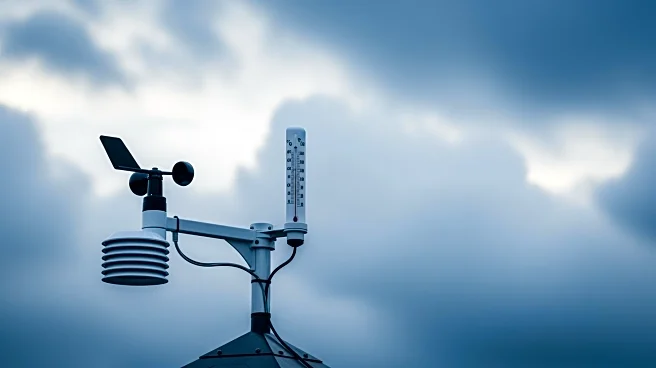What's Happening?
President Trump is set to host a private dinner at the White House with top business executives, including the CEOs of Nasdaq and JPMorgan Chase. This event is part of Trump's broader economic agenda to deepen
ties with corporate leaders and strengthen U.S. capital markets. JPMorgan Chase has announced a $1.5 trillion investment program aimed at industries central to U.S. national security and economic resilience, including supply chain, manufacturing, defense, aerospace, energy independence, and frontier technologies. The bank plans to deploy up to $10 billion through direct equity and venture-capital investments in U.S. companies critical to national security. The dinner underscores Trump's efforts to leverage private-sector investment to secure the United States' position in high-tech manufacturing and energy supply chains.
Why It's Important?
The dinner with Wall Street CEOs highlights the administration's focus on strengthening economic ties and promoting domestic production. By engaging with corporate leaders, Trump aims to bolster U.S. capital markets and rebuild critical supply chains, which are vital to national security. JPMorgan's investment program reflects a significant commitment to supporting industries that enhance economic resilience. This initiative could lead to increased investment in key sectors, driving innovation and growth. The administration's efforts to leverage private-sector investment may also influence public policy and regulatory frameworks, impacting the broader economic landscape. The focus on reshoring industries and expanding domestic production aligns with national security priorities and could shape future economic strategies.
What's Next?
The outcomes of the dinner and subsequent discussions with Wall Street CEOs could influence the administration's economic policies and initiatives. The focus on reshoring industries and leveraging private-sector investment may lead to new partnerships and collaborations between the government and corporate leaders. As the administration seeks to promote economic growth, it may face challenges in balancing domestic priorities with global trade tensions. The success of JPMorgan's investment program will be closely monitored, as it could set a precedent for other financial institutions to follow suit. The administration's engagement with corporate leaders may also impact regulatory decisions and public policy, shaping the future of U.S. economic strategy.
Beyond the Headlines
The dinner with Wall Street CEOs raises questions about the role of corporate influence in shaping public policy and economic strategy. As the administration seeks to strengthen ties with business leaders, it must navigate potential conflicts of interest and ensure transparency in decision-making. The focus on national security and economic resilience highlights the intersection of business and government priorities, prompting discussions about the ethical implications of corporate involvement in public policy.










